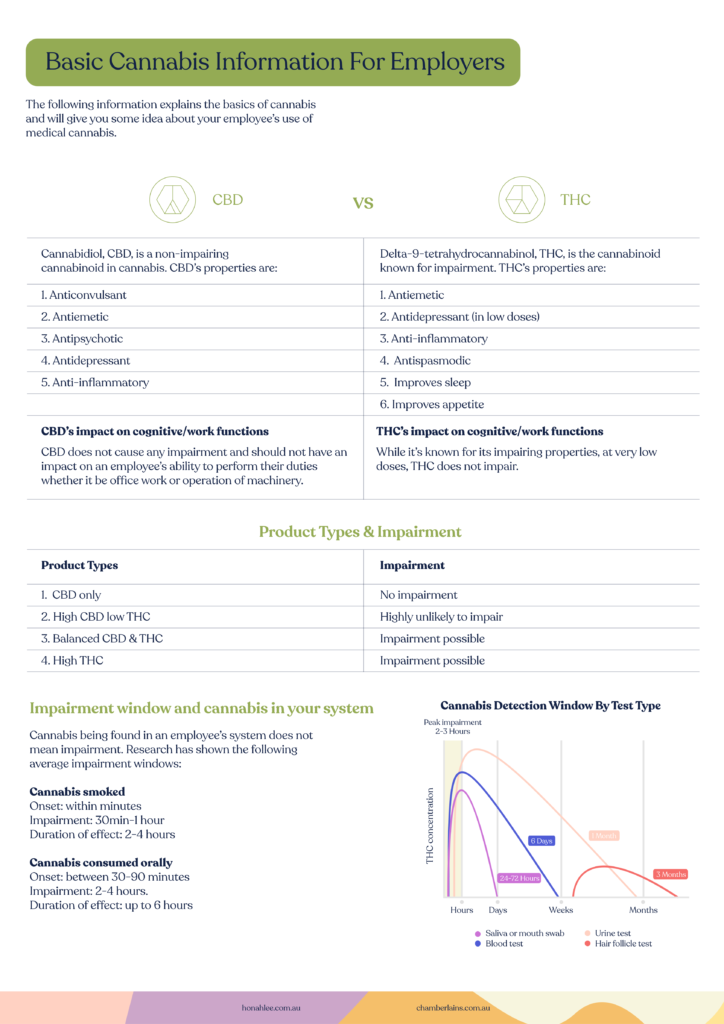Employee rights for medicinal cannabis patients (Australia)
Medical cannabis has been legal in Australia since 2016. However, patient numbers started to grow rapidly in 2019 and we now have over 35,000 active patients. Since legal medical cannabis has become more popular, an increasing number of patients and potential patients have begun to worry about their employment rights. Patient-employees from various industries wonder whether they can get fired for using medical cannabis. There’s also a lot of fear about cannabis drug testing at work.
While we understand that cannabis, whether legal or illegal can be used as medicine, in this article we are focussed on legal medical cannabis and employee rights. So, if you’re in Australia and have a script from a doctor, the information in this article will apply to you.
To help patients interested in learning more and starting a conversation with their employer, honahlee partnered with the Australian law firm, Chamberlains, to create a document that outlines the process for employees and employers to manage cannabis in the workplace. The document provides an overview of your rights as an employee and highlights what to look for in your company’s policies.
We’ve also included a decision tree to help you know when it’s best to speak with your employer. We’ve also included a drug declaration sheet which you can get your medical practitioner to sign and present to your employer to support your conversations about your prescription and use.
For this article we interviewed Stipe Vuleta of Chamberlains Law Firm. We’ll cover the following topics:
- 0:13 | What are a medical cannabis patient’s rights as an employee?
- 02:07 | What if my company has a zero-tolerance policy?
- 03:04 | When should I engage with my employer about medical cannabis use?
- 04:32 | Can I be fired for telling my employer I have a cannabis prescription?
- 05:39 | What if my company has a drug declaration policy that doesn’t include cannabis but allows other impairing drugs?
- 06:46 | What are my rights with random drug tests?
- 08:19 | Do healthcare professionals or teachers have different rights than other employees?
- 11:47 | How can I protect myself from employment issues relating to medical cannabis?
- 15:08 | What can I do if I have a problem with drug testing and my employer?
We’ve also written an article specifically for employees who drive for a living. However, please skim this article before moving on as you’ll want to know about drug declaration policies and random drug tests.
What are a medical cannabis patient’s rights as an employee?
Unfortunately, there isn’t a definitive answer to this question. There are the rights of employees at work and then the intersection of those rights with third-party rights. They fall into three categories:
- Employee’s private rights
- Employer-employee rights
- Third-party rights
For the topic of patients who are employees and their employer, their rights come down to the interaction of workplace policies. The question that must be answered is, “What does my workplace policy say?”
For example:
Can you have a couple of wines and return to work? You’re not operating heavy machinery so it doesn’t matter if you’re under the influence of a medication which may impair your ability to drive or which might make you drowsy.
You have to take the context of your work into consideration along with an understanding of your workplace policies. The two, in conjunction, will dictate what your rights are as an employee.
What if my company has a zero-tolerance policy?
“What we have found is that it’s a shaker fries test. The fair work commission and the federal courts will throw all the facts into a bag, shake them up with seasoning (context) and inside you’ve got shaker fries. And, what they’ve tended to find is that there’s no such thing as a zero-tolerance policy.”
When it comes to zero-tolerance policies, the law is actually unsettled. Legal precedent has shown that there is no such thing as a zero-tolerance policy. The case that set this precedent was called Mr Gary Hilder v Sydney Trains [2019] FWC 8412.
In summary, an employee smoked a joint (illegally) the night before going to work. The following day the employee was urine tested and was found to be THC positive. The employee was dismissed under their zero-tolerance policy. The court ruled that the dismissal was unfair and took various factors including other company policies, definition and understanding of policy by employer and employees, and history of policy application into account.
All of the facts of a case and the surrounding circumstances are weighed when deciding if an employee is truly breaching a policy and whether the employer policies are just or valid.
When to engage with your employer about medicinal cannabis
There are two things you need to do to get started. Firstly, determine whether you’re comfortable waiving your privacy rights and secondly read all of your workplace policies.
If it’s a liberal policy that allows the consumption of prescribed medications, then you might choose to waive your right to privacy and openly engage with HR about the policies.
In an environment where there is a ‘zero-tolerance policy’, rather than waiting for an incident to occur and challenging policy on the basis of murky laws, you may want to engage with your employer about the legal medical treatment that you’re undertaking and how that interacts with your work.
Because, ultimately it could be found that the mistreatment of an employee outside of very narrow circumstances, in which the consumption of cannabis, either recreational or medicinal would impair their ability to do their work might be discriminatory.
“A dismissal could simply be deemed unfair dismissal because it might not be a valid reason to sack someone, even if a policy says that it is. So, engagement with your employer is always useful.”

Can I be fired for telling your employer you have a cannabis prescription?
No. There’s no basis for an employee to be dismissed by an employer for holding and legal prescription of any kind.
Here’s another important aspect of the law. In some instances, if you’ve been suffering from substantial long term impairment, you may be deemed by the state or federal government to have a disability.
If a prescription for any medication that helps your condition leads to you being treated differently for having that medicine, that may be considered discrimination. So, in certain states and territories, you might have access to rights, which you may not have in other states and territories for being discriminated against as well as under the federal scheme.
What if my company has a drug declaration policy that doesn’t include cannabis but allows other impairing drugs?
Firstly, if you don’t want to talk about it with your employer then, that’s okay because of your privacy rights. However, if you don’t discuss it with them, you’re relying on the ‘unclear’ law if you do end up in trouble. When speaking with Stipe, he suggested the following:
“My view would be that a proactive approach is the best approach. Discuss the scenario with your employer. For example, you might say something like, “Heavy opioids are okay under this particular policy or are subject to an exemption or have been engaged in by other staff under prescription. I’m actually a legal medical cannabis patient. Here’s my prescription, here’s how it benefits me and here’s why it won’t impair me at work.”
Because the law is unsettled, it would appear that a flexible workplace policy with the right engagement between employer and employee would protect both parties.
What are my rights with random drug tests?
Your rights as a medicinal cannabis patient are the same as any other employee. You may refuse drug tests at work, however, if you refuse a drug test in the context of a clear and defined policy you may be sanctioned by your employer.
“Working backwards through that most negative outcome, if you are proactive about your engagement with your employer and you’ve disclosed your medicinal cannabis prescription and consumption, then there’ll be no reason to refuse a test. If there’s a policy and you haven’t done the wrong thing, then stick to the policy.”
Important: The rules around cannabis and driving, however, are black and white. It’s illegal to drive with any THC in your system. This makes random drug tests for those who drive for a living more complex. It also makes getting the job of a driver more difficult. To learn more, see the Patients Who Drive For A Living article.
Do healthcare professionals or teachers have different rights than other employees?
These types of employees often work in places that have a “zero-tolerance policy” because the individuals are looking after children, the sick or elderly, or they’re in emergency rooms. So, these employees may have restrictions on them as individuals which other workplaces might not have.
While these employees have the same rights as other employees and their rights are based on employer policies, these employees probably shy away from pushing the limits of what’s appropriate or usual in those workplaces. However, Stipe pointed out cases that may have an impact on employees in these types of workplaces.
“There have been a number of recent cases which deal with the capacity and obligation of an employee to refuse to divulge certain personal information.
These cases involved information like location data from phones and various information from apps which people might have on their phones or other devices. This data would show an employer that the individual they may or may not be subject to certain risks such as attending unsafe places or being subject to quarantine or to infectious diseases.
What those cases ultimately found were that it can be a breach of privacy law for an employer to compel an individual, to share certain information about themselves.”
An individual may be protected from being dismissed or losing their job because they refuse to share certain information, whether that is personal information or because they refuse a drug test.
But, what can end up happening, for example if someone refuses a drug test, is that their role may change due to sanctions. If this happens, then the individual may be unavailable or unable to do their work in the appropriate way.
“Then we get into the murky territory of well, is the employer creating a circumstance where someone who has a legitimate medical condition is being discriminated against, or is it a circumstance in which someone has a condition which may or may not be the subject of discrimination laws? Or, has the person put themselves in a position where they’re unable to fulfil their employment obligations because of their refusal to engage in a certain activity?
So linking it back to that particular industry sector, it may be very challenging for certain doctors or emergency room staff or nurses to continue on with their employment if they’re refusing drug testing when that drug testing might be verifying their general safety and compliance with other policies, which are unrelated to the use of medicinal cannabis.
So again, back to what I feel is the theme of my comments in this interview, engage proactively with your employer and be open. When you’re doing something which is legal and prescribed by a medical professional, there’s no reason why you shouldn’t be open about it with your employer.”
How can I protect myself from employment issues relating to medical cannabis?
If you’re about to start a job, make sure you read the workplaces policies before starting and make sure you’re working within the policies.
If you’re already in a workplace and you’re prescribed medical cannabis then be open to the extent that you feel comfortable with your employer.
“And to the extent that there are policies which might conflict with your legal and appropriate medicinal use of cannabis in or around the workplace, engage with your employer proactively about it. If you can’t or don’t get the outcome you want, then working with others in our collective community to help you in that advocacy piece, whether it’s engaging with an online community or professionals, like a lawyer, might assist in the process as well.”
The most important place, however, is to start by having a strong understanding of your workplace policies and how they impact you as a medical cannabis patient.
Workplace policies: what to look for and actions to take.
Most workplaces will call their policy a “Drug and Alcohol Policy”, however, workplaces that have heavy machinery and higher risk activities will usually have various policies which deal with workplace intoxication and prescribed medications.
If you ask for your workplace policies in a digital format you can easily search the policies for buzzwords that relate to:
- Prescribed medications
- Substances of intoxication
- Controlled substances
“Look for all of the various buzzwords which your HR professional might have used to either properly or improperly describe cannabis.”
Then read those policies in-depth and ask your peers and HR what their policing processes are. If you’re on-site, talk to a site foreman or someone who’s been working there for a while. Ask the following questions:
- What is the policy for drug testing?
- What happens if you are tested positive to various substances?
- What’s the history of the employer’s response to testing positive?
Remember, it’s not just about what the policy is, but also about the nature of work that you do and the history of the employer, and also their response. These will all play a factor into not only your rights but also what could happen if you were to test positive without having spoken to your employer first.
What can I do if I have a problem with drug testing and my employer?
If you’re having trouble with your employer prior to drug testing or if you’ve tested positive, the first step is to obtain legal advice.
“There is a multitude of lawyers who provide pro bono legal advice for those that are in financial distress. And, if you’ve just lost your job, you may qualify for their pro bono programs. Community centres or legal aid centres may also be able to help.
If recent case law has shown anything, it’s that it is not a dead set outcome even if you’ve been dismissed as a result of testing positive on a drug test at work.
Conclusion
If you’re an employee who has a legal script for medical cannabis, it really depends on what you do for a living and the type of medication you consume. CBD has been found to be non-impairing and often isn’t tested for in drug tests, mouth swabs and urine.
If you’re at a desk and doing work where some drugs of impairment (ie. alcohol, opioids or benzos) are acceptable or acceptable via a drug declaration policy, then medical cannabis shouldn’t be a concern – speak with your employer.
If you’re operating heavy machinery or driving for a living this is a very complex area. The advice is still to engage with your employer because you are not doing anything illegal by having a script. You will, however, need to have a strong understanding of your workplace policies and be prepared to spend time with your employer going through the policies. This road could put you in a difficult situation, however, it’s likely to be worth it once you and your employer are on the same page.
With any employment matters where you could potentially lose your job, it’s important you get any help you might need. Working with your HR team or representative, colleagues and most importantly a legal professional is going to get you the best outcome for both you and your employer.



